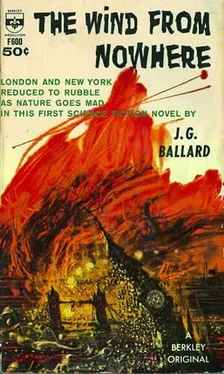"We were just cursing these damn silly bulletins you people are putting out," Avery said. "Are you trying to convince yourselves it's a calm summer's day?"
"What's the real news, Andrew?" Maitland pressed. "I got in half an hour ago and it sounded as if the Russell wasn't the only place coming down."
"It isn't," Symington told him. His face looked drawn and tired. He lit a cigarette, inhaled quickly. "Everything I've heard indicates that we can expect the wind strength to go on increasing for several days more at least. Apparently localized areas of turbulence have to appear first, while the over-all wind strength continues to increase, and they've shown no signs of doing so. Whatever happens, it's bound to go up another fifty at least."
Avery whistled. "Over 230! God Almighty." He tapped the wooden wall partition which was springing backward and forward as air pressed its way past. "Do you think this place will stand it?"
"This building probably will, even if it loses the roof, but already most of the domestic houses in the British Isles are starting to come down. Roofs are flying off, walls caving in-not all that many modern houses are fitted with basements. People are running out of food, trying to leave their homes to reach the aid stations. They're being sucked out of their doorways before they know what's hit them, carried half a mile within ten seconds." Symington paused. "We aren't getting much news in now from the States and western Europe, but you can imagine what the Far East looks like. Governmental control no longer exists. Most of the radio stations are just putting out weak local identification signals."
For half an hour they talked, then Symington left them and Maitland slipped off to sleep, still wearing his wind suit. He was vaguely aware of Avery's getting up to go out on duty, then sank into a heavy restless sleep.
Six hours later, as they listened to their briefing in one of the lecture rooms at the far end of the depot, the sounds of collapsing masonry thudded dimly in the distance. The walls shifted uneasily, as if one end of the depot were seized in the mandibles of some enormous insect. An outside wall carrying the stairway up to the roof at the windward end of the barracks had collapsed, dropping the stairway like a pile of plates. Luckily the internal walls that divided the stairway from the remainder of the barracks held long enough for them to extricate themselves and most of their luggage, but five minutes after they retreated to the adjacent building the barracks toppled in a whirling cloud of dust and exploding brickwork.
The captain up on the dais raised his voice above the approaching rumble. "I'll keep this short so we can get out before the place comes down on our necks. Wind speed's up to 180, and frankly the overall situation is grim. The big job now is to move as many people as we can to underground shelters, and we're pulling out of central London and setting up ten major command posts around the outer circular road. Ours is the U.S. Air Force base at Brandon Hall, near Kingston. The deep bunkers there should give us enough room to get a sick bay with about three hundred beds going. There'll be a navy transport and rescue unit, and they'll try to move people into all the deep shelters-railway tunnels, factory basements and so on-in the immediate area. It's going to be pretty difficult. Some big new transports coming in from Woolwich are supposed to stand up to five-hundred-mile-an-hour gales, but even so we'll only be able to move a small proportion of the people we find, and we'll have to pick those who have food with them. Our own supplies are only good for about three weeks."
He paused and looked down at the rows of somber faces. "I hate to say it, but it looks as if casualties are going to be as high as fifty per cent."
Maitland repeated the figure to himself, trying to digest it. Impossible, he thought. Twenty-five million people? Surely they would cling to life somewhere, at the bottom of deep ditches, chewing old leaves and grass roots. He listened vaguely as the briefing continued, wondering if these preparations would soon prove as inadequate as the first had been.
They shuffled out and took their places in one of the queues winding down the corridors to the transport pool, listening to the mounting rumble from the streets outside. Gusts of filthy air drove through, and the floorboards below Maitland's feet were thick with dirt. The entire topsoil of the globe was being systematically loosened and windborne. The sky was black with dust.
From the talk near him he filled in his impressions of the crisis. The government, centered in the War Office, were dug into their Whitehall bunkers, communicating by radio with the ring of command stations around London and with similar posts in the provinces. An estimated 1,000,000 men-the three armed services, national guard, civil defense and police-were directly controlled by the government and a good proportion of these were involved in organizing and preparing deep shelters wherever they existed. Only a small fraction, perhaps 200,000, were actually employed in rescue work.
Maitland speculated shrewdly that preparations were now in band for a final retreat of the COE inner core-government and service chiefs, with a few people such as Marshall -to some secret bastion where survival could be assured for a good deal longer. He had tried to report his discovery at Marshall 's Park Lane house, but the senior officers at the depot were too busy to listen to him, and anyway had no authority outside the unit. Besides, Hardoon, with his army of construction workers and fleets of equipment, might well be working for the government.
When he finally slung his suitcase up into one of the half-tracked personnel carriers and climbed in after it, there were only a dozen men left in the depot.
The troop carrier was shunted up against one of the Centurions, the two jibs locked together. Both vehicles were loaded with concrete slabs three feet long and 18 inches thick, canted to exaggerate the original slope of the armor plate and provide the minimum wind resistance.
Maitland settled himself among the kitbags and suitcases and peered out through the narrow glass window, an inch-high slit just behind his head. Only two others were with him; an RAF flight sergeant and a young signals corporal.
After a long wait the engines roared out and they edged forward up the exit ramp. As they neared the end of the ramp the horizontal door was retracted and the 180 mph airstream moving across the flat parade ground lifted the carrier out like an enormous hand, slewing it around under a hail of fist-sized stones. The driver gunned the engine and pulled them back on course, and with the Centurion pulling ahead they moved toward the gateway and then through into Green Park. Maitland looked out at the darkened slopes. Stumps of trees stuck up through the turfless soil, littered with stones, gravel and miscellaneous debris that piled up against the embankment walls like refuse in an abandoned municipal dump.
They stopped just past Hyde Park Corner in the entrance to Knightsbridge. Maitland pressed his face to the window slit, looked out at the dim outlines of the office blocks and apartment buildings in the darkness. All of them were shaking perceptibly, heavy tremors jolting the roadway under the carrier. The roofs had been stripped away and Maitland could see the sky through the open top-floor windows. Many of the upper floors had fallen in. All the small shops and boutiques had been completely gutted, their plate glass smashed, interiors cleaned out to the last hatpin and hair curler.
Swinging to the right of the roadway, on the way dislodging the shell of a Jaguar that had trapped itself in a shopfront and now skittered off ahead of them, they avoided the debris piled across their path and pressed on toward the Brompton Road. As they passed Lowndes Square Maitland craned to look up at his apartment house, counting the floors to his own apartment. The building was still intact, but all its lights were out. As they moved on he wondered what had happened to Susan.
Читать дальше









